仁爱七年级下册一般过去时
仁爱版英语七年级下册Unit7Topic3一般过去时语法课优秀教学案例

(一)情景创设
在教学过程中,我注重情景的创设,以激发学生的学习兴趣和积极性。通过引入有趣的故事情境,如小明和小红在过去的一天里的经历,让学生在情境中感知和体验一般过去时的意义。同时,我还设计了一些真实的交流场景,如购物、旅游等,让学生在实际语境中运用一般过去时进行交流,提高他们的语言运用能力。
(二)讲授新知
在讲授新知时,我会结合教材和学生的实际情况,系统地讲解一般过去时的构成、用法和时态转换等知识点。我会用生动的例子和直观的演示,帮助学生理解和掌握一般过去时的规律。同时,我会通过一些练习题,让学生在实践中运用一般过去时,巩固所学的知识。
(三)学生小组讨论
在学生小组讨论环节,我会将学生分成小组,并给出一些讨论题目,如:“Can you think of some sentences using the past tense?”、“How do we know if a sentence is talking about the past?”等。学生可以在小组内进行讨论和交流,分享自己的观点和经验,并通过合作解决问题,提高自己的语言运用能力和思维品质。
(二)问题导向
在教学过程中,我以问题为导向,引导学生主动探究和发现一般过去时的规律。通过提出一些引导性问题,如“How do we know if a sentence is talking about the past?”,让学生在思考和回答问题的过程中,逐步理解和掌握一般过去时的用法。同时,我还鼓励学生提出自己的问题,并进行讨论和交流,培养他们的问题解决能力。
3.小组合作:我将学生分成小组,进行小组合作学习。通过设计一些互动活动,如角色扮演、小组讨论等,让学生在小组合作中共同完成任务,共同解决问题。这种小组合作的方式,不仅能够提高学生的团队协作能力,还能够促进学生之间的交流和合作。
仁爱版英语七下unit7Topic3语法课件一般过去时态共30张

am/ is are
was were
每天,早餐我吃鸡蛋和牛奶。 I _h_a_v_eeggs and milk for breakfast every morning.
昨天,早餐我吃面条。 I __h_a_dnoodles for breakfast yesterday morning.
他每天都吃水果。 He __h_a_s_ fruit every day.
3.助动词do, does did
Байду номын сангаас
4.行为动词用过去式
一般过去时以动词的过去式来表示,
没有人称和数的变化.(was,were除外)
I went to school yesterday. They went to school yesterday.
一般过去时的谓语构成:由动词 的过去式构成(参看书本)
1.外加助动词did后,动词须返回原形。
Did he went to school yesterday? F Did he go to school yesterday? T
2.简略回答用助动词did/didn’t代替 行为动词。 Did he find the boy yesterday? -Yes, he did. -No, he did not (didn’t).
Does he go to school by bus every day?
_D_i_d he _g_o_to school by bus yesterday?
don’t/ doesn’t
didn’t
do/ does
did
谓语构成
1.动词 be
was , were
2.动词 have, has
仁爱英语七年级下册过去式及练习教学文案
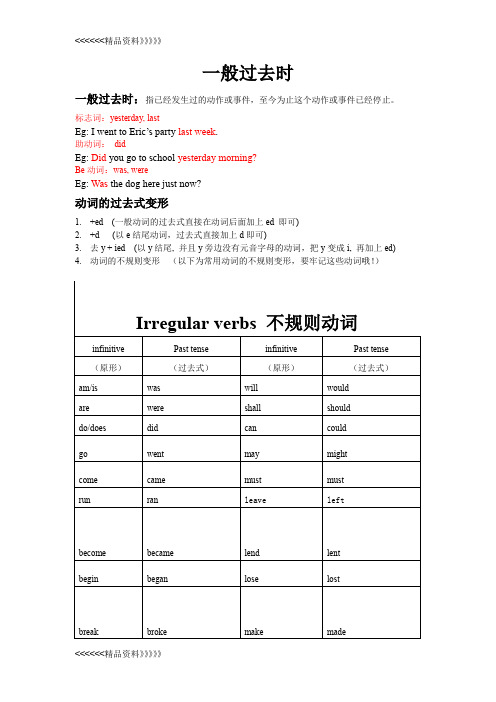
一般过去时一般过去时:指已经发生过的动作或事件,至今为止这个动作或事件已经停止。
标志词:yesterday, lastEg: I went to Eric’s party last week.助动词:didEg: Did you go to school yesterday morning?Be动词:was, wereEg: Was the dog here just now?动词的过去式变形1.+ed (一般动词的过去式直接在动词后面加上ed 即可)2.+d (以e结尾动词,过去式直接加上d即可)3.去y + ied (以y结尾, 并且y旁边没有元音字母的动词,把y变成i, 再加上ed)4.动词的不规则变形(以下为常用动词的不规则变形,要牢记这些动词哦!)Irregular verbs 不规则动词infinitive Past tense infinitive Past tense (原形)(过去式)(原形)(过去式)am/is was will wouldare were shall shoulddo/does did can couldgo went may mightcome came must mustrun ran leave leftbecome became lend lentbegin began lose lostbreak broke make madebring brought mean meant build built meet met buy bought pay paid catch caught ride rode choose chose rise rose come came run ran draw drew say said drink drank see saw drive drove sell sold eat ate send sent fall fell sing sang feed fed sit sat find found sleep slept fly flew speak spoke forget forgot spend spent get got stand stood give gave swim swam go went take took grow grew teach taught have/has had tell told hear heard think thought hold held throw threw keep kept wake woke know knew wear wore learn learned/learnt win won leave left write wrote hit hitlet letput putread read句型变换1.一般疑问句:变换句型的规律与一般现在时一致,但是助动词必须使用did,动词的过去式要变回原形。
仁爱版英语七年级下册Unit7Topic3一般过去时语法课说课稿
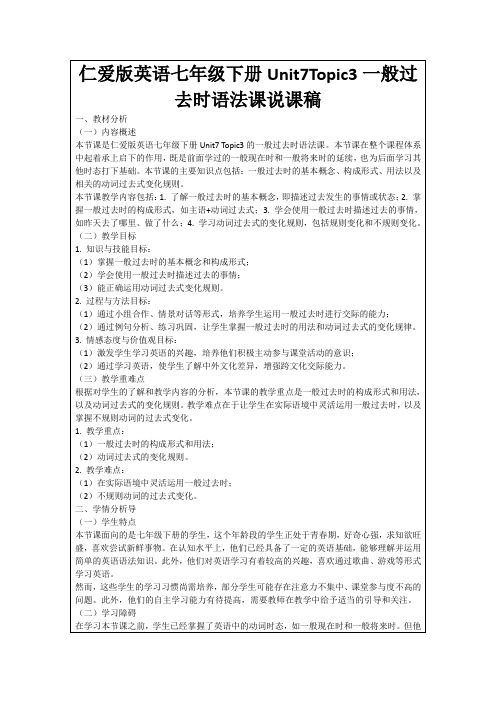
(二)学习障碍
在学习本节课之前,学生已经掌握了英语中的动词时态,如一般现在时和一般将来时。但他们可能对一般过去时的理解不够深入,容易与其他时态混淆。可能存在以下学习障碍:
2.实物和图片:展示与过去事件相关的实物和图片,帮助学生更好地理解一般过去时的应用场景。
3.互动白板:方便学生上台演示、互动,提高课堂参与度。
4.网络资源:提供丰富的在线学习资源,拓展学生的知识视野。
(三)互动方式
1.师生互动:通过提问、答疑、示范等方式,引导学生积极参与课堂,关注学生的学习状态,给予及时反馈。
(2)动词过去式的变化规则。
2.教学难点:
(1)在实际语境中灵活运用一般过去时;
(2)不规则动词的过去式变化。
二、学情分析导
(一)学生特点
本节课面向的是七年级下册的学生,这个年龄段的学生正处于青春期,好奇心强,求知欲旺盛,喜欢尝试新鲜事物。在认知水平上,他们已经具备了一定的英语基础,能够理解并运用简单的英语语法知识。此外,他们对英语学习有着较高的兴趣,喜欢通过歌曲、游戏等形式学习合作精神和自主学习能力。其理论依据为社会建构主义,认为学习是学生在社会互动中建构知识的过程。
(二)媒体资源
我将使用以下教具、多媒体资源和技术工具辅助教学:
1.多媒体课件:展示一般过去时的用法、动词过去式的变化规则等,形象生动地呈现教学内容,提高学生的学习兴趣。
1.对一般过去时的构成形式和用法理解不透彻;
2.动词过去式的变化规则掌握不牢固,尤其是不规则动词的过去式;
3.在实际语境中,难以灵活运用一般过去时进行表达。
仁爱版英语七年级下册Unit7Topic3一般过去时语法课教学设计
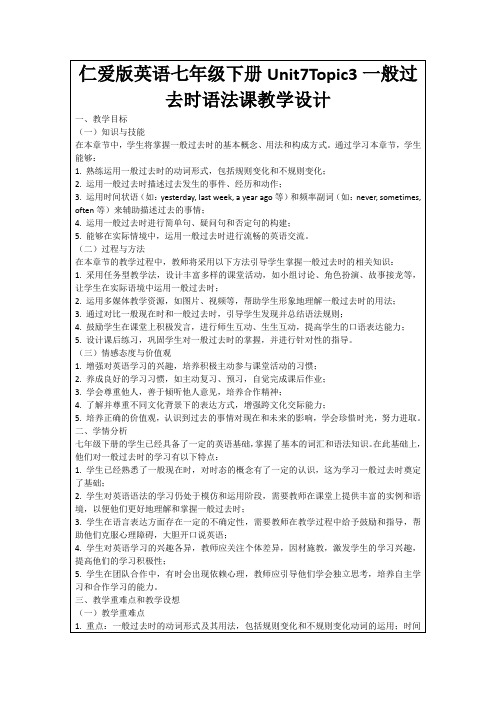
四、教学内容与过程
(一)导入新课
1.教师以学生熟悉的生活场景为切入点,如:“Yesterday, I went to the zoo and saw many interesting animals. What about you? Did you do anything special yesterday?”通过提问,引导学生用英语描述自己昨天的事情,激发学生对一般过去时的兴趣。
二、学情分析
七年级下册的学生已经具备了一定的英语基础,掌握了基本的词汇和语法知识。在此基础上,他们对一般过去时的学习有以下特点:
1.学生已经熟悉了一般现在时,对时态的概念有了一定的认识,这为学习一般过去时奠定了基础;
2.学生对英语语法的学习仍处于模仿和运用阶段,需要教师在课堂上提供丰富的实例和语境,以便他们更好地理解和掌握一般过去时;
4.运用一般过去时进行简单句、疑问句和否定句的构建;
5.能够在实际情境中,运用一般过去时进行流畅的英语交流。
(二)过程与方法
在本章节的教学过程中,教师将采用以下方法引导学生掌握一般过去时的相关知识:
1.采用任务型教学法,设计丰富多样的课堂活动,如小组讨论、角色扮演、故事接龙等,让学生在实际语境中运用一般过去时;
4.家长辅助作业:鼓励学生与家长用英语交流,用一般过去时描述他们小时候的一个难忘的故事。家长可以在学生的描述中适时提问,帮助学生练习一般过去时的疑问句和回答。
5.自主学习:学生自主查找一般过去时的其他用法和例句,可以选择英语学习网站、英语故事书或相关视频资源,记录下来并在课堂上分享。
6.预习作业:提前预习下一课的内容,了解一般将来时的基本概念和用法,为接下来的学习做好准备。
(完整版)仁爱英语七年级下册过去式及练习

一般过去时一般过去时:指已经发生过的动作或事件,至今为止这个动作或事件已经停止。
标志词:yesterday, lastEg: I went to Eric’s party last week.助动词:didEg: Did you go to school yesterday morning?Be动词:was, wereEg: Was the dog here just now?动词的过去式变形1.+ed (一般动词的过去式直接在动词后面加上ed 即可)2.+d (以e结尾动词,过去式直接加上d即可)3.去y + ied (以y结尾, 并且y旁边没有元音字母的动词,把y变成i, 再加上ed)4.动词的不规则变形(以下为常用动词的不规则变形,要牢记这些动词哦!)句型变换1.一般疑问句:变换句型的规律与一般现在时一致,但是助动词必须使用did,动词的过去式要变回原形。
e.g. I went to school yesterday. Did you go to school yesterday?He was five years old last year. Was he five years old last year?They had a good time last Sunday. Did they have a good time last Sunday?2.特殊疑问句:同一般现在时规律, 注意助动词和be动词的变化e.g. I played football with my friends yesterday afternoon.When did you play football with your friends?练习一.写出过去式am _____ ride _____ buy _____ watch _____ write_____is _____ visit_____ bring_____ go _____ water_____are _____ swim _____ take _____ run _____ do_____二.用“am , is , was”填空。
仁爱英语七下一般现在时、现在进行时及一般过去时比较.

时态大比拼 • She got up at seven o'clock yesterday. • (用 now改写) • She is getting up now . • (用 every day改写) • She gets up at seven o'clock every day.
时态大比拼
单数的构成:
①直接加-ed. 过去式 的构成: ②以e结尾只加d. ③重读辅元辅,双写尾字母再加-ed.
④以“辅音+y”结尾变y 为i 再加-ed.
现在分词 have - having
第三人称单数 study- studies
过去式 need- needed
look - looking
begin- beginning use-
4. someone, somebody, nobody, everything, something等不定代词及指示 代词this, that作主语时,是第 三人称单数.如: 1).Everyone is here.大家到齐 了. 2)This is a pen.这是一支钢笔. 3).That is an eraser.那是一块 橡皮.
They aren’t having classes. 5.Jane played the guitar last night. Did Jane play the guitar last night? Jane didn’t play the guitar last night.
表格对比学习
对比 动词形式 时态 现在进 be+v-ing 行时 (现在分词) 一般现 在时 一般过 去时 V -原形 V-三人单 V-ed (过去式) 否定句 在be 后 加上not 一般问句 Be提到 句首 在行为v.前借用 Do,Does do ,does后加not, 提到句首, 行为动词 行为动词还原 还原 在行为v.前借 用did后加not, 行为动词还原 Did 提到句 首,行为 动词还原
仁爱版英语七年级下册 Unit 7【单元知识梳理】

When _w_e_r_e_ you born? I _w_a_s__ born in January,1999.
When was Kangkang born? He _w__a_s_ born on May 13th, 2005.
Where _w_a_s_ he born? He was born in China.
2a. Work out the rules of forming ordinal numbers and fill in the blanks. Then listen, check and repeat.
1 one
first
1st
2 two
second
2nd
3 three third
3rd
4 four
You are so smart! I'd like to take these flowers to the party.
Summary
1.一般过去时的概念 一般过去时表示过去某个时间发生的动作或存
在的状态,常和表示过去的时间状语连用, 如:last year, yesterday等; 也可表示过去经常反复发生 的动作,常和often, always等频度副词连用。 Example:①I saw him in the street yesterday.
-Yes, we did. (No, we didn’t.) 特殊疑问句:疑问词+did + 主语+动词原形+其他? Example: What did you do last night?
Summary
一般过去时口诀
一般过去时并不难,表示过去动作、状态记心间。 动词要用过去式,时间状语句末站。 否定句很简单,didn’t 站在动词原形前,其他部分 不要变。 一般疑问句也好变,did放在句子前,主语、动词 原形、其他部分依次站。 特殊疑问句也简单,疑问词加一般疑问句记心间。
仁爱版英语七年级下册Unit7《语法复习一般过去时》课件

6. sit-- sat 7. drink-- drank
14.learn-- learnt 15.mean--meant
8. drive-- drove
写出下列不规则动词的过去式
16.eat-- ate 17.have-- had 18.bring--brought 19.buy-- bought 20. find-- found 21. think--thought 22. catch--caught 23. teach--taughtLeabharlann 动词一般过去式变化规律 :
①词尾+-ed: played , performed
②以e结尾, 直接+d: danced , closed
③辅音+y, 把y变为i, 再+-ed: tried , worried, studied
④重读闭音节且结尾只一辅音字母,
双写+ed:
stopped, planned
• cost cut hurt put let read • 花费 剪切 受伤 放置 让 读
The usage of Simple Past Tense
• 1.表示过去的单一动作 • She made flowers for her grandpa yesterday. • 2.表示过去的持续动作或状态。 • She was a teacher before. • 3.表示过去反复发生的动作。 • She got up early last week.
24.draw --drew 25.fall-- fell 26.fly-- flew 27.know-- knew 28.do-- did 29.make-- made 30.take-- took
最新仁爱版英语七年级下Unit7-topic1-知识清单

仁爱版英语七年级下Unit 7 知识清单Topic 1语法聚焦一般过去式1.一般过去时表示过去某个时间发生的动作或存在的状态,常与 a minute ago,two days / months / years ago, yesterday, last year, in those days, just now,in 1990等表示过去的时间状语连用。
一般过去时也表示过去经常或反复发生的动作。
(1)过去存在的状态。
My father was at work yesterday afternoon.(2)过去某个时间发生的动作。
I got up at 6:30 yeste rday.(3)过去经常或反复发生的动作。
He always went to work by bus last year.2.Be动词在一般过去时中的变化:(1)am和is在一般过去时中变为was。
(was not=wasn’t)(2)are在一般过去时中变为were。
(were not=weren’t)(3)带有was或were的句子,其否定、疑问的变化和is, am, are一样,即否句在was或were后加not,一般疑问句把was或were调到句首。
Eg:Were you born in July,1999?—Yes, I was./No,I wasn’t.3.句中没有be动词的一般过去时的句子(行为动词一般过去时态)否定句:didn’t +动词原形,如:Jim didn’t go home yesterday.一般疑问句:在句首加did,句子中的动词过去式变回原形。
Eg:Did Jim go home yesterday?特殊疑问句:⑴疑问词+did+主语+动词原形?Eg:What did Jim do yesterday?⑵疑问词当主语时:疑问词+动词过去式?Eg:Who went to home yesterday?4.动词过去式变化规则:(1) 规则动词一般在动词末尾直接加-ed,如:pull-pulled, cook-cooked(2) 结尾是e加d,如:taste-tasted, move-moved(3) 末尾只有一个元音字母和一个辅音字母的重读闭音节应双写末尾的辅音字母,再加-ed. 如:stop-stopped, plan-planned(4)以“辅音字母+y”结尾的,变y为i,再加-ed, 如:study-studied(5)不规则动词过去式:am/is-was, are-were, do-did, see-saw, say-said, give-gave, get-got, go-went, come-came, have-had, eat-ate, take-took, run-ran, put-put, make-made,read-read,write-wrote,draw-drew, fly-flew, ride-rode,speak-spoke,sweep-swept,swim-swam,sit-sat,drink-drankSection A1.—When was he born,do you know? 你知道他什么时候出生的吗?--He was born in June,1985. 他出生在1985年6月。
仁爱版七年级下一般过去时专讲专练修订版
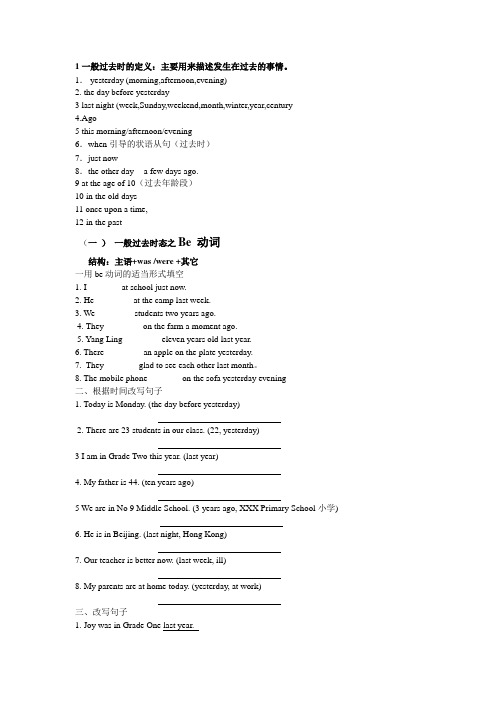
1一般过去时的定义:主要用来描述发生在过去的事情。
1. yesterday (morning,afternoon,evening)2. the day before yesterday3 last night (week,Sunday,weekend,month,winter,year,century4.Ago5 this morning/afternoon/evening6.when引导的状语从句(过去时)7.just now8.the other day -- a few days ago.9 at the age of 10(过去年龄段)10 in the old days11 once upon a time,12 in the past(一)一般过去时态之Be 动词结构:主语+was /were +其它一用be动词的适当形式填空1. I _______ at school just now.2. He ________ at the camp last week.3. We ________ students two years ago.4. They ________ on the farm a moment ago.5. Yang Ling ________ eleven years old last year.6. There ________ an apple on the plate yesterday.7. They _______ glad to see each other last month。
8. The mobile phone _______ on the sofa yesterday evening二、根据时间改写句子1. Today is Monday. (the day before yesterday)___________________2. There are 23 students in our class. (22, yesterday)___________________3 I am in Grade Two this year. (last year)___________________4. My father is 44. (ten years ago)___________________5 We are in No 9 Middle School. (3 years ago, XXX Primary School 小学) ___________________6. He is in Beijing. (last night, Hong Kong)___________________7. Our teacher is better now. (last week, ill)___________________8. My parents are at home today. (yesterday, at work)___________________三、改写句子1. Joy was in Grade One last year.否定句:一般疑问句:肯定回答:否定回答:特殊疑问句:2. Lily was in Qingdao yesterday一般疑问句:肯定回答:否定回答:特殊疑问句:3.I was at home the day before yesterday一般疑问句:肯定回答:否定回答:特殊疑问句:4..The twins were in a primary school last term一般疑问句:肯定回答:否定回答:特殊疑问句:5 There was some orange in the cup(变一般疑问句) _______ there _______ orange in the cup?6 How is Jane yesterday? (改错)____________________7 There _________ (be) no one here a moment ago四单项选择( )1. My father______ill yesterday.A. isn't B. aren't C. wasn't D. weren't( )2.______your parents at home last week﹖A. Is B. Was C. Are D. Were( )3. The twins______in Dalian last year.They______here now.A. are; were B. were; are C. was; are D. were; was ( )4.______your father at work the day_____yesterday (前天)﹖A. Was; before B. Is; beforeC. Was; after D. Is; after( )5.—Who was on duty last Friday﹖A. I am B. I was C. Yes, I was D. No, I wasn't( ) 1. My father______ill yesterday.A. isn’t B. aren’t C. wasn’t D. weren’t( ) 2.______your parents at home last week﹖A. Is B. Was C. Are D. Were( ) 3. The twins__in Dalian last year.They__here now.Aare; were B. were; are C. was; are D. were; was( ) 4.___your father at work the day__yesterday﹖A. Was; before B. Is; beforeC. Was; after D. Is; after( ) 5—Who was on duty last Friday —__A. I am B. I was C. Yes, I was D. No, I wasn'(二)一般过去时态之情态动词结构:主语+情态动词过去式+其它情态动词的一般现在时can / shall / will / may / must情态动词的一般过去时could / should / would / might / must情态动词特点:1 不随主语变化而变化2 后跟动词原形3 否定在后加not 疑问把它提前具体用法:一can /could 能会could 更委婉Eg Can you play basketball?— Y es,I can. /No, I can’t.Could I take you home?— Yes,youcan. /No, I’m afraid not.二Shall表意愿将,要常用第一人称/should 应该Eg Shall I /we go fishing?-----All right. \OK. \Good idea.三will表意愿将,要常用于任何人称/would 表意愿更委婉将,要Eg Would you like to go with me?-----Yes, I'd like to. /I’d love to/Please-------No,thanks/I’m afraid not四May/Might 能可能也许might 更委婉Eg May I drink a cup of tea?-----Yes,you may. No, you mustn’t. (禁止)Might I go now?我可以去吗?—Yes, you may. 可以。
仁爱七年级下册一般过去时
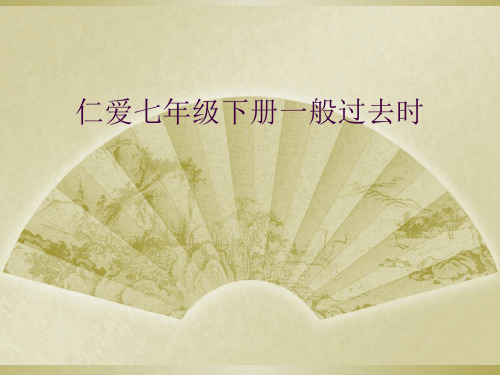
looked missed helped watched
/t/
听读音并归纳
played /eI/ moved planned performed
/d/
planted needed recited wanted
/id/
规则动词词-ed的读音
清念 /t/ ,元 浊/d/ ; /t/ /d/ 之后念/id/
I was 12 last year. The weather was fine yesterday. He played football last weekend.
一般过去时:主要用来表示____发生的动作或状态。常与______过__去____ 连用,动词用__________. 如: _______(昨天), ________(上周), ___________(三年以前) , in 1978….
2.YestDeriddaJyawneassiKnganagskoanngga’st tbhiretphadratyy. (la变st否Su定n句da)y. ___________________________________________
3. They had a birthday party at home yesterday. (就划线部提问) ___Y__es_te_r_d_a_ythweaysn__’t_K__anagbkiartnhgd’saybiprathrdtyay.esterday?
18
19
Example : last Sunday, Tom went to the shop and bought a pair of sports shoes. On his way home, an old
仁爱版英语七年级下册 Unit7_Topic1_语法讲解:一般过去时态

语法讲解:一般过去时态表示一般过去式的动词通常用动词的过去式形式来表示,而动词的过去式是在动词原形的根底上变化的。
动词的过去式可分为规那么动词和不规那么动词。
规那么动词的过去式变化如下:〔1〕一般情况下,动词词尾加-ed ,如:worked played wanted acted〔2〕以不发音的-e 结尾动词,动词词尾加-d,如:lived moved decided declined hoped judged raised wiped〔3〕以辅音字母+ y结尾的动词,把-y变为-i 再加-ed,如:studied tried copied justified cried carried embodied emptied〔4〕以一个辅音字母结尾的重读闭音节动词,双写词尾辅音字母,再加-ed,如:stopped begged fretted dragged dropped planned dotted dripped〔5〕注:不规那么动词的过去式变化规律性不强,须多加记忆。
go - went,make - made,get - got ,buy - bought ,come - came ,fly-flew ,is/am-was,are-were ,see-saw ,bring-brought,do-did,teach-taught, think-thought, are-were, say-said, sit-sat. Read-read, spend-spent.用法:〔1〕表示过去某一时刻或某一段时间内所发生的动作或情况,通常一般过去式带有表示动作时间状语的词,词组或从句,如yesterday, the day before last, last week, two days ago 等,上下文清楚时可以不带时间状语。
I worked in that factory last year. 去年我在那一家工厂工作。
- 1、下载文档前请自行甄别文档内容的完整性,平台不提供额外的编辑、内容补充、找答案等附加服务。
- 2、"仅部分预览"的文档,不可在线预览部分如存在完整性等问题,可反馈申请退款(可完整预览的文档不适用该条件!)。
- 3、如文档侵犯您的权益,请联系客服反馈,我们会尽快为您处理(人工客服工作时间:9:00-18:30)。
looked missed helped watched
/t/
听读音并归纳
played /eI/ moved planned performed
/d/
planted needed recited wanted
/id/
规则动词词-ed的读音
清念 /t/ ,元 浊/d/ ; /t/ /d/ 之后念/id/
仁爱七年级下册一般 过去时
记忆大比拼
What did they do yesterday?
看看你记住了几项视频中 出现的活动,说对一项获 得一分奖励。
2
快速反应 说出下列各词的过去式(past form)
①
1 play-----2 look---3 perform-4 miss---5 wash---
Yesterday wasn’t Kangkang’s birthday. _____ _____ they _____ a birthday party yesterday?
4.We came back so late because we went to the movie. (就划线部提问)
W__h_e_r_e__d_i_d_ you _____ back sohalavtee?
大写
11
造句练习 昨天他们玩得很开心。
肯定句:They enjoyed themselves yesterday. 否定句:They didn't enjoy themselves yesterday. 一般疑问句: Did they enjoy themselves yesterday? 回答: Yes, he did./ No, he didn't.
I was 12 last year. The weather was fine yesterday. He played football last weekend.
一般过去时:主要用来表示____发生的动作或状态。常与___过__去_______ 连用,动词用__________. 如: _______(昨天), ________(上周), ___________(三年以前) , in 1978….
②
1 recite---2 live--3 like--4plauyseed--5 dance--looked
performed
missed
washed
一般在动词原形末尾加ed
recited lived liked used
danced
结尾是 e 的动词加 d
3
快速反应 说出下列各词的过去式
③ 1 plan---2 beg-3 fit--4 shop --5 stop--
On Saturday _____(read)
smoomgroentibnogo, kIs
and
______(watch)
TV.
In
the
afternoon,
I
____(do)
housework.
I
_____(go)
shopping with my friends in the evening. I _____(be) busy but happy on the weekend.
4
快速反应
⑤ 1 am/is-----2 have/has---3 sit----4 make---5 bring---
⑥ 1 are---2 do---was
3 sing--4 buy--- had
5 fall---
sat
made
brought 不规则动词过去式需要单独记忆
were did sang bought fell
6
辨一辨 A. watched B. looked C. planted A. missed B. played C. helped A. performed B. recited C. needed
7
展示两组句子,让学生对比发现不同.
I am 13 this year. The weather is fine today. He plays football every weekend.
Why did
come
14
请同学们根据下面短文回答问题 Kangkang and Li Ming were busy last week. They went to Beijing by plane. They went to Xiangshan Park and visited the Great Wall. They were excited. • Where did Kangkang and Li Ming go? • When did they go? • What did they do there? • How did they feel?
15
根据图片写一篇60左右的作文
开头:Last Sunday, Tom went to… 16
一般过去时:主要用来表示____发生的动作或状态。常与___过__去_______表示连用,动词用__________. 如:_______(昨天), ________(上周), ___________(三年以前) , in 1978….
(2012重庆)
A.tomorrow B. two weeks ago
C. today D. in 2 weeks
2. She ___ up late yesterday. (2011天津)
A. gets B. will get C. is getting D. got
3. —When ___ Jane____ to New York?
总结:实义动词过去式的句式
否定句:主语+_______________________+其它。 一般疑问句:____+主语d+i_d_n_o_t_(_d_i_d_n+'t其)+它动?词原形
肯定回答:Yes,主语+_D_i_d. 否定回答:No,主语+______.
动词原形
did
didn't
12
1. They had a good rest after big exams___.
2.YestDeriddaJyanweassinKgaangskonangga’ts tbhiertphadratyy.l(a变st否Su定nd句ay) .
___________________________________________ 3. They had a birthday party at home yesterday. (就划线部提问)
Liu Qian / perform magic trick
10
造句练习 他上周上课迟到了。
肯定句: 否定句:
He was late for class last week . He was not late for class last week .
一般疑问句:
Was he late for class last week ?
过去的时间状语
一般过去时
yesterday
last week
three years ago
1. be动词过去式的句式。
否定句:是在___________后面加 not, 一般疑问句: 是把was / wwaesre/_w__e_re___________,
要求首字母要______。
提前并放到句首
大写
2. 实义动词过去式的句式
否一般定疑句问:句主语:+_______+_主__语__d+__i_d___n__o__t_(__d__i__d__n_+'_t其_)+_它动_+?词其原它形。
Did
动词原形
17
根据所给问题写一篇50字左右的短文 1.Where did you go? 2.What did you do? 3.How was your weekend? I went to… last weekend. I visited/ had/ played… My weekend was really …
played
had
read
went was
watched did
9
Pair work(两人对话) What did he/she/they do yesterday?
They / sing songs Lily / dance
Jack / play the piano
Li Ming / perform Kung fu
18
19
结语
谢谢大家!
④ 1 try----pla32nnccearydrr--y----4 worry--begged 5 study---
fitted
shopped
stopped
tried
cried carried worried studied
末尾只有一个辅音字母的重读闭音节词,双写这个辅音 字母后加 ed
末尾是“辅音字母+y”的动词 变“y”为“i”加 ed
过去的时间状语
过去时
yesterday
last week
three years ago
8
用所给词的适当形式完成短文:
A Busy Weekend
I ____ (get) up early last weekend. Then I ______(play) sports. I _____(have) milk and bread for breakfast.
回答:Yes, he was. / No, he wasn’t.
